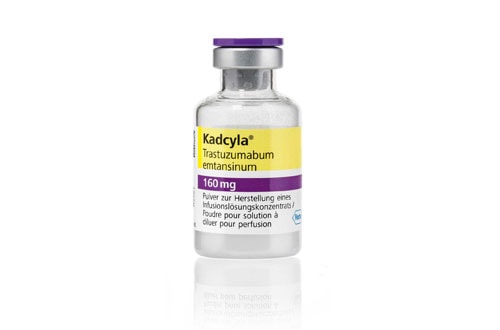
Roche and the National Institute for Health and Care Excellence (NICE) are at each other’s throats over NICE’s refusal to recommend breast cancer drug Kadcyla (trastuzumab emtansine) on the NHS.
NICE insists it is “very disappointed” that Roche “has decided not to offer its new treatment at a price that would enable it to be available for routine use in the NHS”.
But the Swiss manufacturer has hit back strongly, saying that it was not commercially possible to make what it insists would have to be a 60 per cent cut to the drug’s £90,000 price tag if it were to meet NICE’s cost-effectiveness threshold.
Roche said it did offer to reduce the drug’s cost through a patient access scheme and will appeal NICE’s decision – adding that NICE’s appraisal system is “broken”.
Kadcyla is indicated to treat HER2-positive breast cancer that has spread to other parts of the body, cannot be surgically removed and has stopped responding to initial treatment, and is available in England through the Cancer Drugs Fund.
But in final draft guidance today, NICE “concluded that [Kadcyla’s] high price made it impossible for it to recommend despite evidence of its benefits to patients”.
There is no argument over Kadcyla’s effectiveness: in trials it extended the lives of women with advanced HER2-positive breast cancer by an additional 5.8 months compared with the currently licensed treatment combination.
Kadcyla is an antibody-drug conjugate (ADC) that combines the monoclonal antibody in Roche’s own Herceptin (trastuzumab) with ImmunoGen’s DM1, a cytotoxic payload designed to boost its ability to kill tumour cells.
But it is also the eighth consecutive therapy for advanced breast cancer to be rejected by NICE since 2011, Roche says.
Jayson Dallas, Roche Products’ general manager, said: “NICE’s rejection of Kadcyla demonstrates quite simply that their current system is broken, not fit for purpose and in need of a complete overhaul when it comes to advanced cancer.
“Despite Roche offering a significant discount we are once again disappointed that NICE has not shown any flexibility on access to Kadcyla – a drug with qualities that NICE chief executive, Sir Andrew Dillon, described on live television as ‘impressive’.”
Kadcyla’s linker technology has taken more than 30 years to develop and the drug itself has been in development for more than 15 years, the manufacturer said.
NICE’s Sir Andrew is implacable, however. “We are really disappointed that Roche were not able to demonstrate more flexibility to help us make a positive recommendation,” he said. “The company is well aware that we could not have recommend Kadcyla at the price it proposed.”
Roche believes that the Pharmaceutical Pricing Regulatory Scheme (PPRS) gives NICE leeway which it has simply not used.
The company argued that NICE has “declined to factor in the cost assurance guaranteed by the PPRS in its calculations which would mean the future drug bill cannot be overspent and would remove the burden of additional cost to the NHS”.
However, Sir Andrew rejected this. “The agreement does not contain this expectation because both the Association of the British Pharmaceutical Industry and the Department of Health agree that obtaining value for money from new drugs is in the interests of the industry and the NHS,” he concluded.




